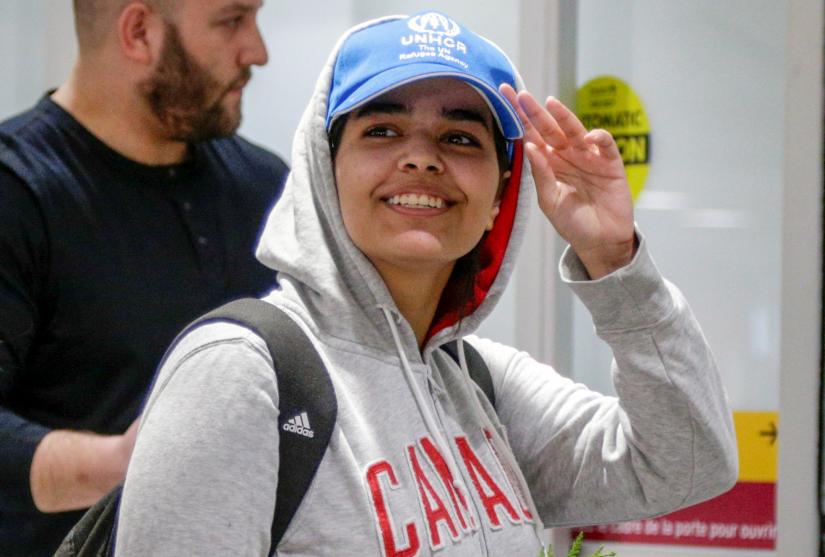 Saudi teenager Rahaf Mohammed al-Qunun has grabbed the world’s attention for defying a strict social code in the middle-eastern kingdom. She said she feared for her life if she was sent home. She launched a Twitter campaign from her hotel room in Thailand pleading for help. The UN has granted her refugee status in Canada, the country that offered her asylum and a new home.
Saudi teenager Rahaf Mohammed al-Qunun has grabbed the world’s attention for defying a strict social code in the middle-eastern kingdom. She said she feared for her life if she was sent home. She launched a Twitter campaign from her hotel room in Thailand pleading for help. The UN has granted her refugee status in Canada, the country that offered her asylum and a new home.
So before we get into details, let’s examine the kind of freedom women actually enjoy in Saudi Arabia. They can now drive, go to the movies and the stadium. But, they still can’t make crucial decisions without the consent of a male guardian. So, they can’t have a passport; they can’t have a bank account or get divorced without permission of their father, brother, uncle or husband. They can’t mix freely with men. They can be arrested for eating at restaurants that don’t have family areas.
Most public buildings are segregated. There’re also restrictions in sports. When Riyadh sent female athletes to the Olympics for the first time back in London in 2012, they had to be accompanied by a male guardian and had to cover their hair. Saudi women must wear a full-length black buyer robe in public designed to protect their modesty.
The message, however, is that Canada’s offer of asylum for Rahaf was a very smart political move on the country's part, especially following its spat with Saudi Arabia.
Last August, Saudi Arabia cut relations with Canada for calling on Riyadh to release dissidents and activists. Canada can now say, “Look, we really mean it when we say that we have a feminist human rights-oriented foreign policy”.
Wouldn’t it be great if Canada institutionalized this kind of feminist human rights policy and applied it to other women who also suffer from domestic abuse, sexual harassment or women suffering from war, for instance, the Yemeni women?
Millions of them continue to starve, be killed, and get amputated, in a war that Canada has indirectly supported through its continued arms sales to Saudi Arabia.
Unquestionably, from the Saudi side, the argument is – it’s a family affair, it should have been resolved internally. You will find no such issues in Saudi Arabia alone but in other Muslim countries. You will find some reactions from people saying perhaps the girl should have approached family courts rather than export this kind of very internal domestic matter to the West.
And, so this is another addition to the long list of irritants between Ottowa and Riyadh. And, this could increase criticism from the international community towards Riyadh. It’s also a very sensitive issue as Rahaf renounced her Islamic faith. This could also provoke an argument from the Saudi perspective and certainly from other Muslim countries asking why Canada is interfering in our religion, in our Sharia law (you’re not allowed to renounce your Islamic faith basically, it’s prohibited).
 Canada, of course, intervened in her case because she was legitimately facing domestic violence. It’s not because of her gender that she was allowed in. It’s because she was facing domestic violence and of course, in the case of Saudi Arabia, when your abuser is also your guardian, you’re frankly in a legal trap. It’s very difficult then for a woman to proceed. So, it’s a double whammy for many women in the country in terms of what this means for other women.
Canada, of course, intervened in her case because she was legitimately facing domestic violence. It’s not because of her gender that she was allowed in. It’s because she was facing domestic violence and of course, in the case of Saudi Arabia, when your abuser is also your guardian, you’re frankly in a legal trap. It’s very difficult then for a woman to proceed. So, it’s a double whammy for many women in the country in terms of what this means for other women.
Rahaf’s attempt is not the first effort to leave the country and Saudi-watchers doubt that she’ll the last. The question will be whether or not there will be others who will try to frankly follow her path and be energised by her success. That’s the case.
Long story short, Rahaf is an individual case. She suffered unspeakable abuse but was fortunate enough to escape. She was fortunate enough to know about Twitter. She was fortunate enough to tweet and have those tweets in English and she was on vacation in Kuwait.
Millions of Saudi women don’t have those opportunities if that’s what we can call them and yet they are suffering multiple forms of oppression. So, going back to our earlier point, it’s high time for Canada to really show how serious it is about institutionalizing more programs to help protect women from other parts of the world.
Finally, this has become an important issue for the Saudi government to finally recognise that if it wants to achieve the dreams it has of the so-called Vision 2030 and other ambitious socio-economic objectives, it needs to start realizing that the women have to be full citizens, which, will not be possible with the guardianship law in effect.
If the Saudi government wants to achieve its vision 2030, envisaging an innovative and creative society, it has to realise that those women are part of that. Equality for women is imperative for a society that’s advancing and progressing. It’s high time to do something and there’s much room for a lot of changes inside Saudi Arabia.
Md. Sharif Hasan teaches International Relations at the University of Rajshahi.


